7 start with K start with K
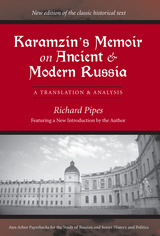
Russian history was typically studied through liberal or socialist lenses until Richard Pipes first published his translation of Karamzin's Memoir. Almost fifty years later, it is still the only English-language edition of this classic work. Still fresh and readable today, the Memoir-in which Alexander I's state historian elaborates his arguments for a strong Russian state-remains the most accessible introduction to the conservatism of Russia's ancien regime. This annotated translation is a "faithful rendition of the letter and spirit of the original," which not only introduces readers to the sweep of Karamzin's ideas, but also weaves together a fascinating version of Russia's rich history. With a new foreword by Richard Pipes, Karamzin's Memoir on Ancient and Modern Russia is a touchstone for anyone interested in Russia's fascinating and turbulent past.
Richard Pipes is Baird Professor of History at Harvard University.
Nikolai M. Karamzin (1766-1826) was a Russian historian, poet, and journalist. He was appointed court historian by Tsar Alexander I.

“In the annals of American diplomacy, the presence of George F. Kennan stands tall and daunting, a figure of articulate intelligence who thought about the action but also beyond it. He was not always a great diplomat, for his imagination was lively, and he lacked the self-effacing patience which is so essential to the profession at its most mundane; but he was a great analyst and policymaker, one of the very few this country has produced in foreign affairs, perhaps finest since John Quincy Adams.”
Thus begins Anders Stephanson's penetrating study of this complicated, often controversial, yet highly respected public man. From an array of intellectual reference points, Stephanson has written what is not only the most serious assessment of Kennan to appear but is also a work of general significance for a wide range of contemporary issues in foreign and domestic politics and culture. Appropriately, the book's emphasis is on Kennan's lifelong attempt to grasp Soviet foreign policy and devise an effective American response, particularly during the decisive period around the Second World War when the contours of our present world order gradually emerged: the period of wartime alliance with the Soviet Union, the ensuing “containment” policies and division of Europe and much of the world into hostile blocs. Stephanson also examines Kennan's strategic vision, his “realistic” approach to foreign policy, and his disdain for the Third World.
An extended final section, “Class and Country,” then situates Kennan as an essentially European kind of “organicist” conservative with no obvious political home in American society, a society manifestly unorganic in all its mobility and mass culture. An outsider without class attachment, he could never reconcile his dislike of American politics and culture with his attachment to values of order and hierarchy. These warring sensibilities produced, for example, vehement denunciations of McCarthyism as well as of the student revolts of the following decade. Yet it was Kennan's marginality, his functional detachment from domestic politics, that made possible his often clairvoyant analyses of foreign affairs.
Stephanson's work is an unusually broad and deep characterization of a reflective, sometimes enigmatic but always outstanding American policymaker and man of letters.
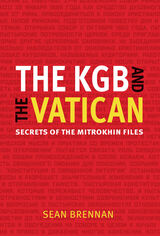
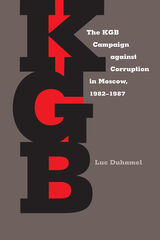
Inthis original study,Luc Duhamel examines the KGB at its pinnacle of power. The appointment of former KGB director Yuri Andropov as general secretary of the Communist Party in 1982 marked the height of KGB influence. For the first time since Stalin, Beria, and the NKVD, there was now an unquestioned authority to pursue violators of Soviet law, including members of the Communist Party. Duhamel focuses on the KGB’s investigation into Moscow’s two largest trade organizations: the Chief Administration of Trade and the Administration of the Moscow Fruit and Vegetable Office. Like many of their Soviet counterparts, these state-controlled institutions were built on a foundation of bribery and favoritism among Communist Party members, workers, and their bosses. This book analyzes the multifarious networks of influence peddling, appointments, and clientelism that pervaded these trade organizations and maintained their ties to party officials.
Through firsthand research into the archives of the Andropov-era KGB and the prosecutor general’s office, Duhamel uncovers the indictment of thousands of trade organization employees, the reprimand of Communist Party members, and the radical change in political ideology manifested by these proceedings. He further reveals that despite aggressive prosecutions, the KGB’s power would soon wither, as the agency came under intense scrutiny because of its violent methods and the ghosts of the NKVD. The reinstatement of Moscow city government control over the trade organizations, the death of Andropov, and the rising tide of democratic reform would effectively end the reign of the KGB and its anticorruption campaigns.
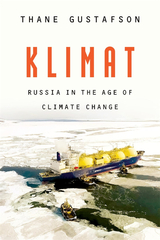
A discerning analysis of the future effects of climate change on Russia, the major power most dependent on the fossil fuel economy.
Russia will be one of the countries most affected by climate change. No major power is more economically dependent on the export of hydrocarbons; at the same time, two-thirds of Russia’s territory lies in the arctic north, where melting permafrost is already imposing growing damage. Climate change also brings drought and floods to Russia’s south, threatening the country’s agricultural exports.
Thane Gustafson predicts that, over the next thirty years, climate change will leave a dramatic imprint on Russia. The decline of fossil fuel use is already underway, and restrictions on hydrocarbons will only tighten, cutting fuel prices and slashing Russia’s export revenues. Yet Russia has no substitutes for oil and gas revenues. The country is unprepared for the worldwide transition to renewable energy, as Russian leaders continue to invest the national wealth in oil and gas while dismissing the promise of post-carbon technologies. Nor has the state made efforts to offset the direct damage that climate change will do inside the country. Optimists point to new opportunities—higher temperatures could increase agricultural yields, the melting of arctic ice may open year-round shipping lanes in the far north, and Russia could become a global nuclear-energy supplier. But the eventual post-Putin generation of Russian leaders will nonetheless face enormous handicaps, as their country finds itself weaker than at any time in the preceding century.
Lucid and thought-provoking, Klimat shows how climate change is poised to alter the global order, potentially toppling even great powers from their perches.
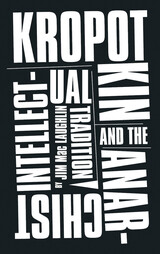

For centuries the exchange of letters between Ivan the Terrible (1530-1584) and Prince Kurbskii, Muscovy's first notable defector, has been considered an authentic and important source for sixteenth-century Russian history. The Ivan portrayed in these letters has dominated posterity's perception of him and his time. But the provenance of the "Correspondence" has never been properly established.
Edward L. Keenan draws on all the tools of source study and literary criticism to demonstrate that the "Correspondence" is a forgery, and in fact was composed some decades later in the seventeenth century. He concentrates on the first letter of Kurbskii, which is the earliest of the letters as well as a source for the later ones, and concludes that it was written between 1623 and 1625 by Semen Ivanovich Shakhovskoi--a conclusion that will necessitate the re-evaluation of sixteenth-century Russian history as it has previously been written by scholars throughout the world.
Keenan discusses at length the implications of his discovery and sketches directions for future study, which will include a reconstruction of our conception of sixteenth- and seventeenth-century political thought, of Ivan's personality--indeed of the nature of his reign--and of the evolution of Muscovite state ideology.
READERS
Browse our collection.
PUBLISHERS
See BiblioVault's publisher services.
STUDENT SERVICES
Files for college accessibility offices.
UChicago Accessibility Resources
home | accessibility | search | about | contact us
BiblioVault ® 2001 - 2024
The University of Chicago Press









